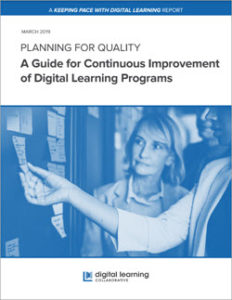Research and Reports from Members of the Virtual Learning Leadership Alliance
The Leadership Alliance members conduct research, share expertise and generate reports on a number of important topics related to online and blended learning.
Online Program Toolkit
Developed by Michigan Virtual, this toolkit is designed to help districts, schools, or organizations create and/or maintain a quality online learning program that fits the needs of students, no matter where you are on this journey. Much of what is covered in this toolkit reflects best practices found in the National Standards for Quality Online Learning, which were developed by experts from across the country.
Key Strategies for Supporting Teachers in Virtual Learning Environments
Published on August 9, 2021
Written By: Christopher Harrington, Ed.D., Michigan Virtual Learning Research Institute and Kirsten DeBruler, Ph.D., Michigan Virtual Learning Research Institute
This report published by Michigan Virtual includes strategies for supporting virtual teachers. The report is based on the current practices shared by 1,809 virtual educators representing 17 statewide virtual schools or programs with a combined 150 years of online and blended learning experience and more than a half million virtual course enrollments annually.
Key Strategies for Engaging Students in Virtual Learning Environments
Published on April 6, 2021
Written By: Christopher Harrington, Ed.D., Michigan Virtual Learning Research Institute and Kirsten DeBruler, Ph.D., Michigan Virtual Learning Research Institute
This report published by Michigan Virtual includes strategies shared by 1,721 virtual teachers participating in the study. The teachers work within the school structures of 17 statewide virtual schools or programs.
Michigan’s K-12 Virtual Learning Effectiveness Report, 2019-20
Published on March 26, 2021
Written By: Joseph R. Freidhoff, Michigan Virtual
Based on pupil completion and performance data reported by public schools to the Michigan Department of Education or Center for Educational Performance and Information, this report, prepared by Michigan Virtual highlights 2019-20 enrollment totals, completion rates, and the overall impact of virtual courses on K012 pupils.
National Standards for Quality Online Learning
The National Standards for Quality Online Learning includes three standard sets including Online Courses, Online Teaching and Online Programs. These standards have been the quality benchmark for online programs, districts and state agencies since 2007.
Oversight of the standards is provided by the Virtual Learning Leadership Alliance, Quality Matters, and the Digital Learning Collaborative. Together these organizations provide oversight and lead a broad-based community effort to keep the standards current and relevant.
Planning for Quality: A Guide for Continuous Improvement of Digital Learning Programs
Wisconsin Digital Learning Collaborative (DLC) consisting of the Wisconsin Virtual School (WVS), the Wisconsin eSchool Network (WEN), and the Department of Public Instruction (DPI), joined together with the Evergreen Education Group, to publish the Planning for Quality Guide, a practical guide to quality review that helps practitioners start asking reflective questions about how their efforts can be continuously improved.
Michigan Virtual Learning Research Institute (MVLRI) Research in Review Series
Michigan Virtual Learning Research Institute (MVLRI) receives directives from the Michigan legislature to define the areas of research in blended and online learning each year. Research is conducted throughout the state, nation and internationally to incorporate a global perspective. Research is also conducted without regard to the provider to ensure that important findings are brought to light and practiced in our own backyard.
Published in 2020, this 10-part series contains report highlights from various MVLRI research studies focused on online and blended learning.
Supporting Students with Disabilities in K-12 Online and Blended Learning
Written By:
Mark E. Deschaine, Central Michigan University
Appropriately supporting students in online and blended learning environments requires a great deal of instructional planning and preparation. When enrolling students with disabilities in online or blended learning programs, additional planning may need to occur so students can be supported with additional programs and services determined by the student’s Individualized Educational Plan (IEP) or from an accommodations plan resulting from a Section 504 meeting. Either way, these added programmatic concerns often require extra levels of consideration, implementation, and evaluation to determine the appropriateness of the online interventions and accommodations. The intent of this document is to supply educational teams content that will provide support for the planning, implementation, and evaluation of programs and services for students with disabilities enrolled in online and blended learning environments.




